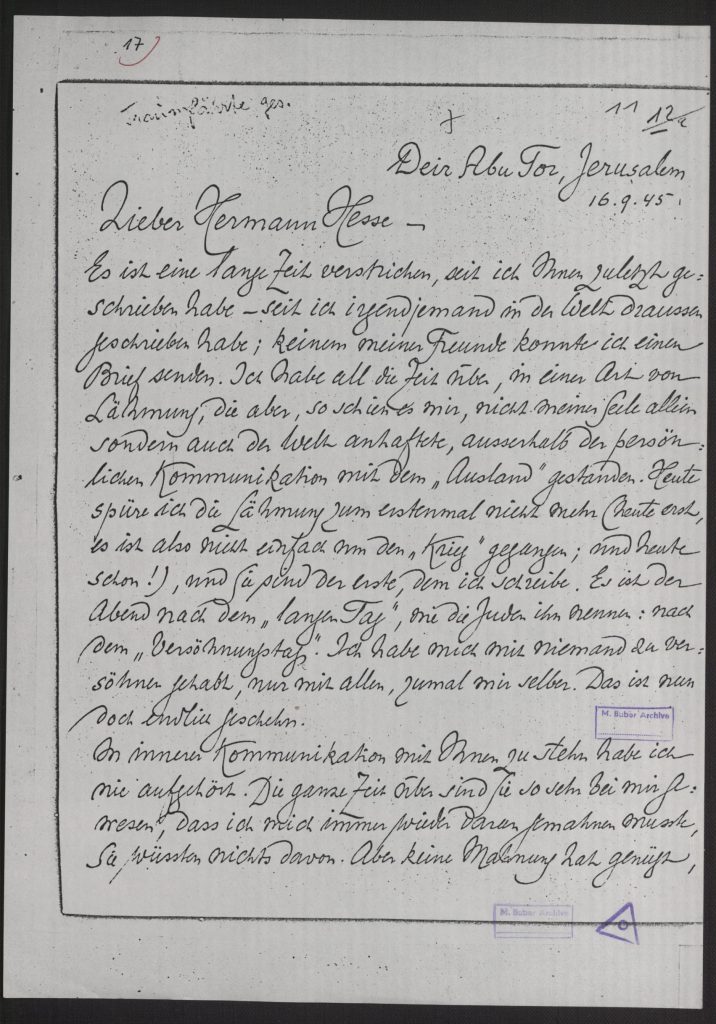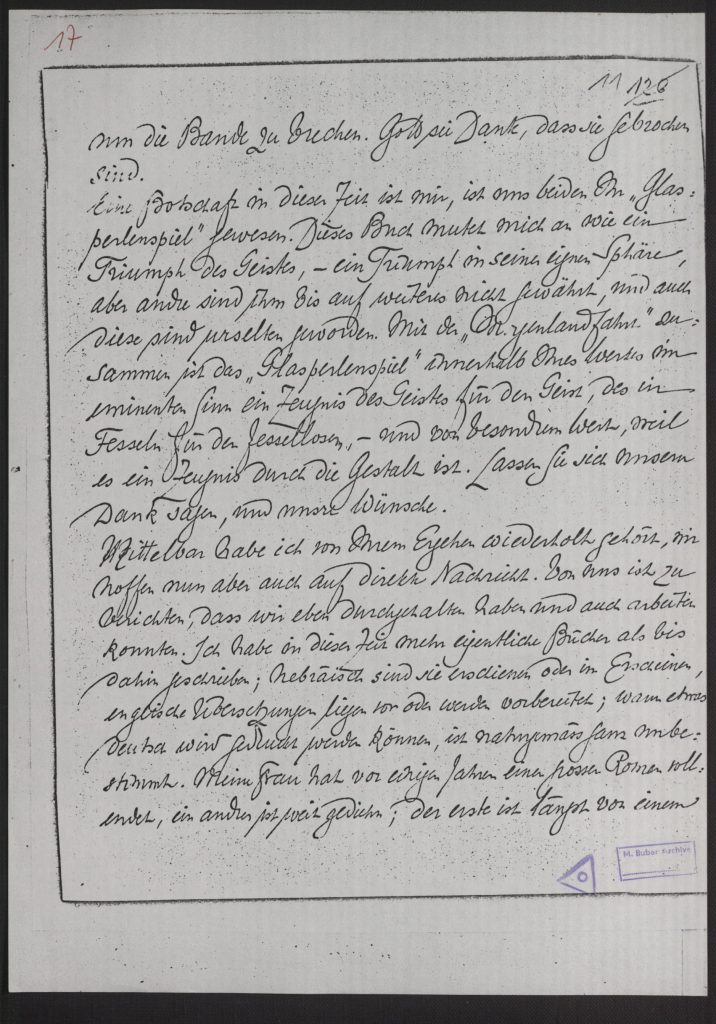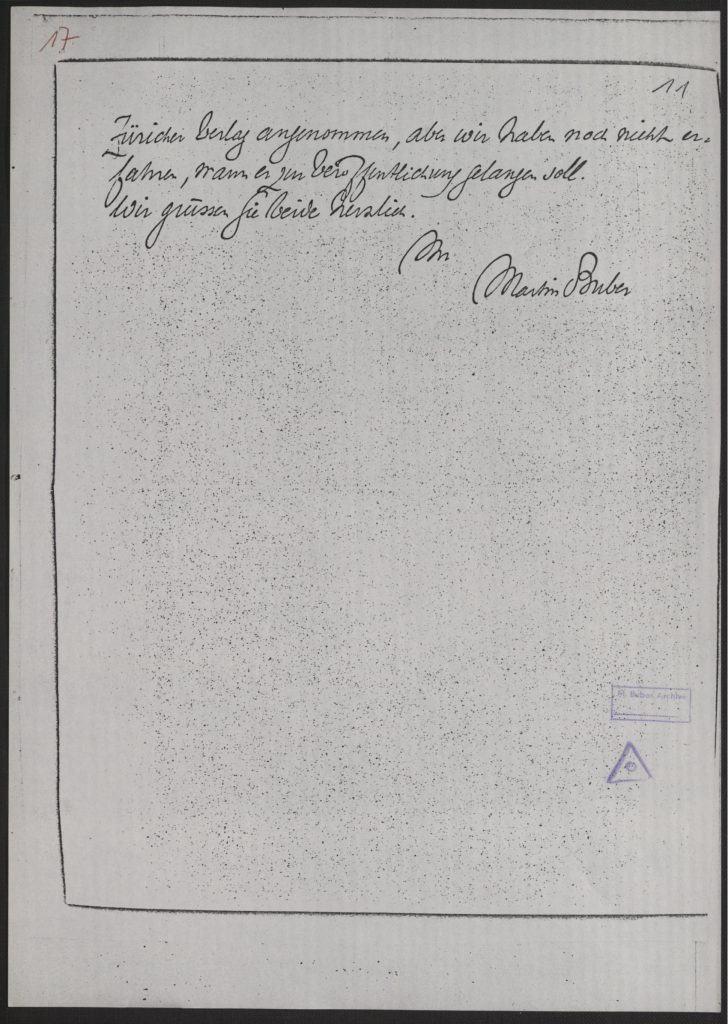Approximately 40,000 letters from Martin Buber’s correspondence with his contemporaries exist, but to this day, they have hardly been accessible. A funding commitment from the federal and state governments should now change this: an academy project for the digitalisation and annotation of this valuable estate will be funded with almost € 400,000 per year.
Literature, art, theology – Martin Buber, one of the most influential thinkers of the modern German-Jewish intellectual world was in active exchange with the representatives and institutions in almost every area of intellectual life. More than 40,000 letters that were written by or to him have been handed down – particularly in the philosopher’s estate in Jerusalem, but also scattered throughout archives around the world. Making this research treasure accessible – that is the goal of the new academy project that Professor Christian Wiese, scholar in the field of Jewish Studies and holder of the Martin-Buber-Chair in Jewish Religious Philosophy at Goethe University, can now tackle thanks to the funds awarded by the federal and state governments. All the letters are to be digitalised as facsimile, and a large portion will also be transcribed, translated and annotated. The project is designed for 24 years and will be funded with € 9.2 million, of which half will come from the Federal Ministry of Education and Research and half from the Hessian Ministry of Higher Education, Research and the Arts. Professor Martin Leiner (Friedrich Schiller University Jena), Professor Abigail Gillman (Boston University) and the National Library of Israel are cooperation partners.
“This is wonderful news.” Professor Birgitta Wolff, President of Goethe University, is delighted about the grant. “With this academy project, Christian Wiese is setting new standards and planting the seed for a work that fits the time in every way,” Wolff remarks, adding that the project is an important contribution to internationalisation in the digital humanities. “It is in fact quite special. There is nothing like it in other countries,” says Professor Christian Wiese, who in 2019 concluded one of the last volumes of the edition of Martin Buber’s published writings. The edition of the letters opens additional perspectives into Buber’s life and work and his many interests – but also into intellectual life overall in the decades between the first World War and Buber’s death in 1965. “Where, if not in Frankfurt, should this project have its home?” observes Wiese.
“The correspondence of Buber, who lived in Heppenheim and taught in Frankfurt, can contribute important new insights to the history of the twentieth century. Especially in our polarised time, we can learn a lot from the philosopher’s approach, which always relied on dialogue and understanding. Christian Wiese’s academy project is for this reason also an exceptional one in Hessen’s research landscape in the humanities. I am very happy that we can co-fund this project and wish it great success,” says Hessen’s minister for Higher Education, Research and the Arts Angela Dorn.
Martin Buber (1868 – 1965) worked at the University of Frankfurt am Main from 1924 to 1933 – first as lecturer and later as honorary professor for Jewish religious teachings and ethics. He resigned from the professorship in 1933 after Hitler took power in anticipation of having his professorship revoked. He subsequently worked on setting up the Central Office for Jewish Adult Education with the Reichsvertretung of German Jews until it was forced to give up its work. Buber emigrated to Israel in 1938 before the November pogrom. Throughout his entire life, Martin Buber was in contact with personalities from all areas of intellectual life, including many writers such as Margarete Susman, Hermann Hesse, Arnold Zweig, Thomas Mann and Franz Kafka. Here, he did not shy away from controversial discussions. “The letters are a fascinating mirror of the time and reveal the intellectual network in which Buber was involved,” says Christian Wiese. Perhaps a quarter of the letters were written by Martin Buber; the rest were written to him. But Martin Buber’s personality and thought are reflected in these as well.
As part of the project, the letters, which are primarily located in Europe, Israel and the USA, are now to be collected and grouped according to thematic modules that stretch over several years, and made digitally accessible in close collaboration with the Academy of Sciences and Literature in Mainz. Depending on the content, transcripts and – where necessary – translations from the Hebrew along with annotations will be added. The academy project provides for three editorial positions and a doctoral scholarship. Annual conferences are planned, as well as intensive cooperation with researchers in Israel and the USA. The positions will be advertised soon so that work can start in the spring.
“Martin Buber and his work are more relevant than ever,“ says Professor Wiese with conviction. “He is one of the most important dialogic thinkers of the twentieth century, and his texts are relevant wherever intercultural or interreligious dialogue takes place. At the same time, they possess great meaning for issues of political ethics.”











